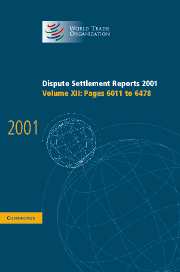Book contents
- Frontmatter
- Contents
- Argentina - Measures Affecting the Export of Bovine Hides and the Import of Finished Leather (WT/DS155): Award of the Arbitrator under Article 21.3(c) of the DSU
- United States - Transitional Safeguard Measure on Combed Cotton Yarn from Pakistan (WT/DS192): Report of the Appellate Body
- United States - Transitional Safeguard Measure on Combed Cotton Yarn from Pakistan (WT/DS192): Report of the Panel
- Argentina - Definitive Anti-Dumping Measures on Imports of Ceramic Floor Tiles from Italy (WT/DS189): Report of the Panel
United States - Transitional Safeguard Measure on Combed Cotton Yarn from Pakistan (WT/DS192): Report of the Panel
Published online by Cambridge University Press: 13 December 2017
- Frontmatter
- Contents
- Argentina - Measures Affecting the Export of Bovine Hides and the Import of Finished Leather (WT/DS155): Award of the Arbitrator under Article 21.3(c) of the DSU
- United States - Transitional Safeguard Measure on Combed Cotton Yarn from Pakistan (WT/DS192): Report of the Appellate Body
- United States - Transitional Safeguard Measure on Combed Cotton Yarn from Pakistan (WT/DS192): Report of the Panel
- Argentina - Definitive Anti-Dumping Measures on Imports of Ceramic Floor Tiles from Italy (WT/DS189): Report of the Panel
Summary
INTRODUCTION
On 3 April 2000, Pakistan requested the DSB to establish a Panel, pursuant to Article XXIII:2 of GATT 1994, Article 6 of the DSU and Article 8.10 of the ATC, to examine a matter involving the application of the transitional safeguard mechanism of the Agreement on Textiles and Clothing by the United States.
The DSB established a panel at its meeting on 19 June 2000. At that meeting, the parties agreed that the Panel should have standard terms of reference. The terms of reference of the Panel are, therefore, the following:
“To examine, in the light of the relevant provisions of the covered agreements cited by Pakistan in document WT/DS192/1, the matter referred to the DSB by Pakistan in that document and to make such findings as will assist the DSB in making the recommendations or in giving the rulings provided for in those agreements.”.
On 30 August 2000, the Panel was constituted as follows:
Chairman: Mr. Wilhelm Meier
Members: Mr. Carlos Antonio da Rocha Paranhos
Mr. Virachai Plasai
The European Communities and India reserved their third-party rights to participate in the Panel proceedings.
The Panel met with the parties on 16 and 17 November 2000 and with India on 17 November 2000. (The EU did not participate in this meeting, see paragraph 5.1.) The second substantive meeting with the parties was held on 13 December 2000.
FACTUAL ASPECTS
In late 1998, the United States undertook an investigation to determine whether combed cotton yarn for sale, identified as Category 301, was being imported into the territory of the United States in such increased quantities as to cause serious damage or actual threat thereof to the domestic industry producing like and/or directly competitive products.
On 24 December 1998, the United States requested consultations with Pakistan pursuant to Article 6.7 of the Agreement on Textiles and Clothing (ATC) regarding Category 301 imports of combed cotton yarn from Pakistan. The report on this investigation, entitled “Report of Investigation and Statement of Serious Damage or Actual Threat Thereof: Combed Cotton Yarn for Sale: Category 301, December 1998”, was presented to Pakistan as the market statement that must be submitted according to Article 6.7 of the ATC in support of the request for consultations on the proposed safeguard action.
- Type
- Chapter
- Information
- Dispute Settlement Reports 2001 , pp. 6067 - 6240Publisher: Cambridge University PressPrint publication year: 2004

